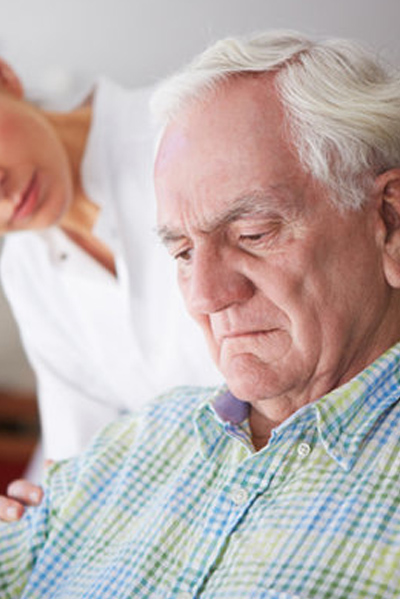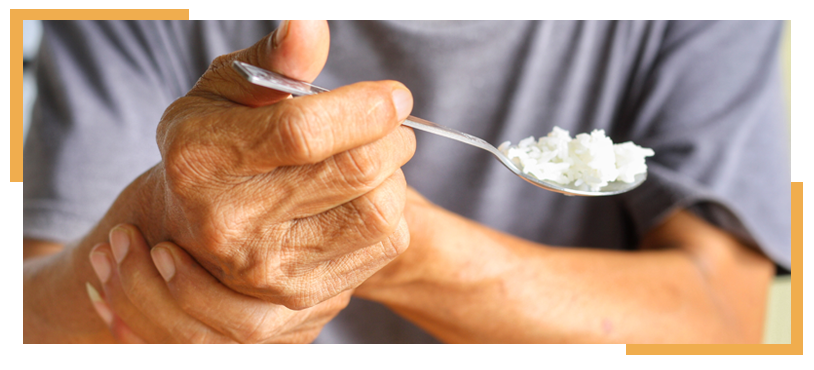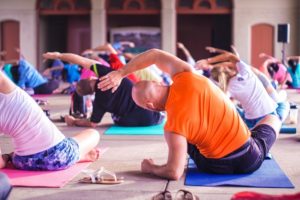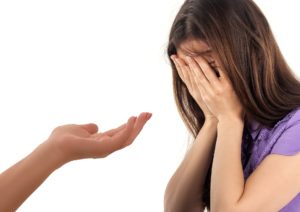Parkinsons Disease
The majority of patient’s with Parkinson’s have developed it spontaneously. Only a small number of cases are considered to be inherited. Parkinson’s disease is characterized by tremors, which is the most common symptom. Parkinson’s currently has no cure, but symptoms can be managed and improve through medications.

What is Parkinson's Disease?
Parkinson’s Disease (PD) is a progressive neurological disorder that normally impacts people past the age of 60. Initial symptoms of Parkinson’s are normally subtle and will gradually become more and more pronounced. Parkinson’s currently is considered incurable, but great strides have been made with medications that can significantly improve and manage some symptoms of PD.
No two cases of Parkinson’s are the same. Initial symptoms may be mild and go unnoticed, and they usually start on one side of the body.
There are 3 categories that Parkinson’s Disease symptoms are split into are: primary motor symptoms, secondary motor symptoms, and non motor symptoms.

What are considered motor signs/symptoms?
Symptoms of a TBI are dependent on the severity of the injury. Moderate-severe TBI’s typically include the signs and symptoms of a mild TBI, as well as other more severe symptoms that may appear shortly after the injury to days after.
What are considered nonmotor signs/symptoms?
- Bowel problems
- Constipation and urinary urgency are commonly an issue in patients with PD.
- Hyposmia.-Hyposmia is a loss of some sense of smell. Even though it’s a common symptom, it’s commonly overlooked as there are no physical signs to be seen.
- Mood disorders. Depression and anxiety are common early signs of Parkinson’s disease.
- Cognitive Difficulties.
- Sleep problems.
Resting Tremors
Resting tremor is when a body part, normally a hand, shakes even when you aren’t using it. The shaking typically stops when you start using the hand or body part that was shaking at rest.
Bradykinesia
Bradykinesia is characterized by slow, small movements. Some examples include: Freezing of gait, flat facial expressions, micrographia or small handwriting.
Rigidity
Rigidity occurs when the muscles remain in a contracted state, rather than contracting and relaxing as normal.
Impaired posture/balance
A result of the symptoms altogether may result in balance problems and trouble maintaining proper posture.
- Slurred & Soft speech
- Trouble Swallowing
Management / Treatment
Parkinson’s isn’t curable at the moment, but medications have shown tremendous benefit in managing certain symptoms and improving others. Surgical procedures are also an option. Deep brain stimulation, where surgeons implant electrodes into specific regions of the brain to send electrical pulses, is seen as an option to people who have unstable medication responses.
It’s well-known that exercise of all kinds is beneficial for patients with Parkinson’s disease. But physical therapy, in particular, is absolutely key. A learned professional can develop a plan of care specific to your needs to help you remain independent. Occupational therapists are helpful in learning new, innovative ways to do tasks independently that may be difficult due to symptoms. Speech therapists help you overcome soft speech and monotone in the voice in patients with Parkinson’s.
It’s well-known that exercise of all kinds is beneficial for patients with Parkinson’s disease. But physical therapy, in particular, is absolutely key. A learned professional can develop a plan of care specific to your needs to help you remain independent. Occupational therapists are helpful in learning new, innovative ways to do tasks independently that may be difficult due to symptoms. Speech therapists help you overcome soft speech and monotone in the voice in patients with Parkinson’s.
It’s well-known that exercise of all kinds is beneficial for patients with Parkinson’s disease. But physical therapy, in particular, is absolutely key. A learned professional can develop a plan of care specific to your needs to help you remain independent. Occupational therapists are helpful in learning new, innovative ways to do tasks independently that may be difficult due to symptoms. Speech therapists help you overcome soft speech and monotone in the voice in patients with Parkinson’s.
It’s well-known that exercise of all kinds is beneficial for patients with Parkinson’s disease. But physical therapy, in particular, is absolutely key. A learned professional can develop a plan of care specific to your needs to help you remain independent. Occupational therapists are helpful in learning new, innovative ways to do tasks independently that may be difficult due to symptoms. Speech therapists help you overcome soft speech and monotone in the voice in patients with Parkinson’s.

Schedule an appointment today
to see why our family of stroke experts can help you and your family on your path to independence.
Therapy for Parkinsons may consist of:
Amplitude Training
LSVT BIG is a global certification/program used to train people with Parkinson’s disease to use their body’s more normally. During the LSVT BIG treatment, you make overexaggerated physical movements to retrain the muscles and slow down the progression of hypokinesia. LSVT LOUD is a global certification/program used by speech-language pathologists to treat patients with Parkinson’s disease. The focus in LSVT LOUD is on increasing vocal loudness. SPEAK OUT! Is another voice therapy program, developed by the Parkinson Voice Project to help patients with Parkinson’s regain their ability to communicate.
Reciprocal Patterns
Your therapist may help you reinforcing reciprocal movement by using a recumbent bike (Nustep) or an elliptical machine. Dance classes and tai chi are also beneficial.
Balance Work
Gait training is an important factor to help you improve your balance in your day-to-day life. A physical therapist can teach you exercises and help you understand how your balance is affected and what you can do to compensate.
Stretching and Flexibility
It is common for patients with Parkinson’s disease to deal with rigidity and tight muscles. Stretching throughout the day and learning different stretching techniques from your therapist for specific muscles may benefit the stiffness that is often an issue.
Strength Training
Strength training is important in gaining more control over your body. Pool-based classes and Blood-flow restriction training are two great options for those in older age, who have difficulty dealing with heavy weights but would still like to develop strength.
Alternative Options
Tai chi
Tai chi may improve flexibility, balance, and muscle strength. Studies have shown that tai chi is a viable option for improving the balance of those with mild to moderate PD.
Yoga
Studies about yoga for Parkinson’s have shown to visibly reduce tremors and improve the steadiness of an individual’s gait.
Boxing
Boxing has many benefits and can help patients improve issues such as gait, balance, dexterity, the ability to multi-task, and restoring confidence.
To make an appointment with a Parkinson’s specialist or to learn more about the One Neuro Parkinson’s Program, please call (972) 845-7875.
To make an appointment with a Parkinson’s specialist or to learn more about the One Neuro Parkinson’s Program, please call (972) 845-7875.
One Neuro Parkinsons Program
At OneRehab, we have a developed a state-of-the-art One Neuro program where we have gone above and beyond to create comprehensive programs for specific neurological disorders. Of these disorders we have worked so tirelessly on is Parkinson’s Disease.
OneRehab’s Parkinson’s program is the most comprehensive rehabilitation program of it’s kind in Dallas. In addition to specialized therapy programs, patients are offered a wide range of recreational programs, such as exercise classes, educational classes, art workshops, and support groups that benefit the mind, body, and spirit.
Our staff is committed to providing excellence in treatment, research, and education for people with Parkinson’s disease as well as their loved ones. The importance of therapy and exercise for Parkinson’s has been well-researched and breakthroughs are continuously coming out.
Our program has been fine-tuned to give the ability for those with Parkinson’s to live their best life. From the start of 1-on-1 therapy to individual/group programs, we are here to build true long-standing relationships with every Parkinson’s patient that walks through our doors. Here’s what we offer:
Physical Therapy
Neurologic Clinical Specialist Physical Therapists: A neurologic clinical specialist is a licensed physical therapist who has completed 2000+ hours of working with individuals who have neurologic dysfunction in a clinical setting. They must complete what is known as the most difficult exam for physical therapists in the Neurologic Clinical Specialist Examination.
This ensures that patients with neurological disorders such as Parkinson’s are receiving the best possible care from the most highly-qualified clinicians to ensure the best possible outcomes.
LSVT BIG: LSVT BIG is a global certification/program used to train people with Parkinson’s disease to use their body’s more normally. During the LSVT BIG treatment program, you make overexaggerated physical movements to retrain the muscles and slow down the progression of hypokinesia.
Occupational Therapy
Along with being the top therapists in treating patients with neurological disorders, OneRehab is proud to be home to 1 of 9 Registered Medical Yoga Therapists in Texas.
Medical Therapeutic Yoga: According to the ADPA, yoga therapy has been shown to visibly reduce tremors and improve the steadiness of an individual’s gait. Yoga is considered one of the most beneficial complementary therapies for Parkinson’s disease (PD), helping to increase flexibility; improve posture; loosen tight, painful muscles; build confidence; and through these benefits enhance the quality of life.
Speech Therapy
LSVT Loud: LSVT LOUD is a global certification/program used by speech-language pathologists to treat patients with Parkinson’s disease. The focus in LSVT LOUD is on increasing vocal loudness.
SPEAK OUT!: SPEAK OUT! Is another voice therapy program, developed by the Parkinson Voice Project to help patients with Parkinson’s regain their ability to communicate.
Outreach Program
Knock Out PD.
Boxing is a noncontact exercise program we use to alleviate symptoms of Parkinson’s disease. Boxing classes are done in a group setting to promote camaraderie and support, as well as to maintain long-term participation in a high-intensity workout program.
Yoga for Every Body, Mind, Soul.
This class includes breathing exercises, mindful awareness activities, and physical movement. Movement may range from seated, chair-based postures to standing, balancing, and strengthening work. All of the movements and posture can be modified to each participant’s unique abilities.
Tai Chi.
Designed for people with movement disorders & balance troubles. Tai Chi can reduce stress and increase energy, as well as improve circulation, muscle tone, concentration and focus, and balance.
- Resources
- https://www.parkinson.org/Understanding-Parkinsons/Treatment/Exercise/Neuroprotective-Benefits-of-Exercise
- https://www.michaeljfox.org/news/exercise-and-parkinsons-frequently-asked-questions
- https://www.parkinsons.va.gov/NorthWest/Documents/Pt_ed_handouts/Exercise_for_PD_1-20-12.pdf
- https://www.hopkinsmedicine.org/health/conditions-and-diseases/physical-therapy-for-parkinsons-disease
OneRehab | Richardson
1761 International Pkwy Suite 135, Richardson, TX 75081, United States
OneRehab | Dallas
6080 N Central Expy #125 Dallas, TX 75206
Email Us
info@onerehab.com
Call Us
972 845 7875
Working Hours
M - F 7:00 AM – 7:00 PM
Sat 8:00 AM – 2:00 PM


